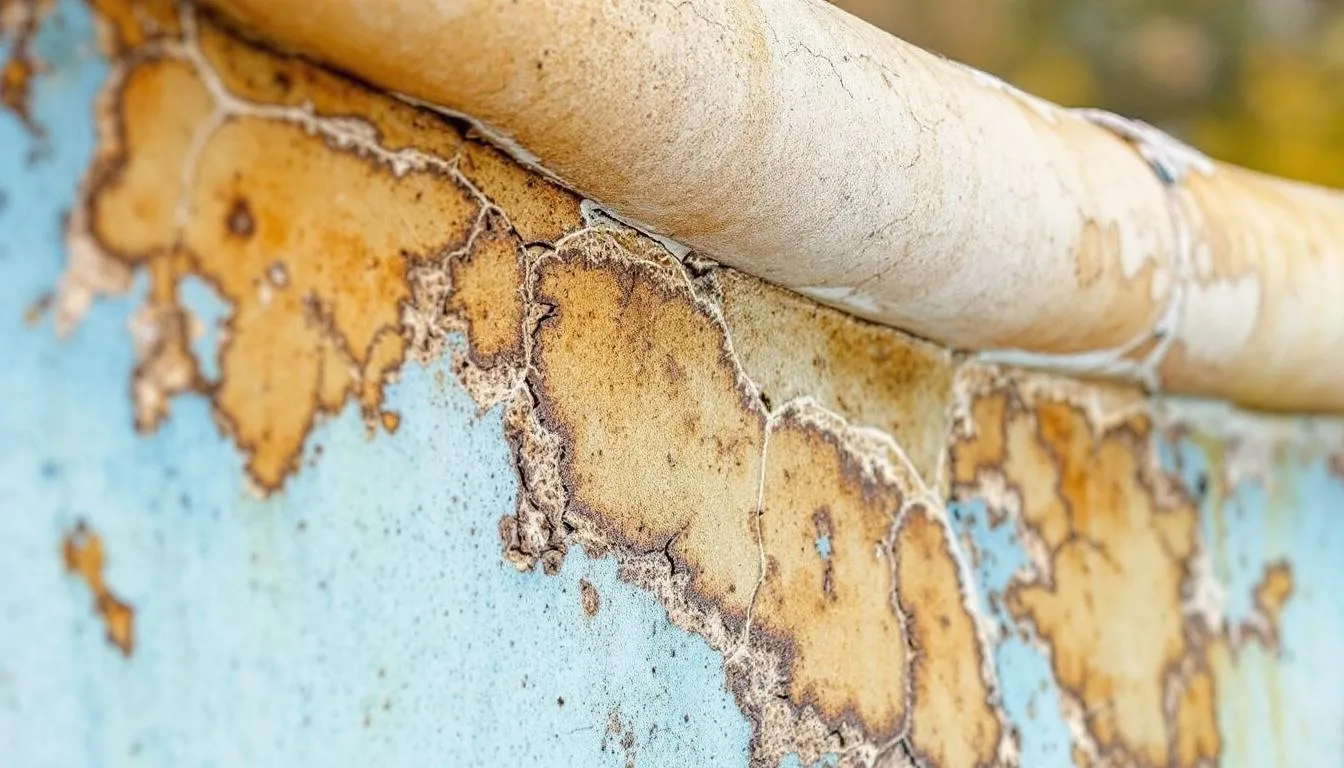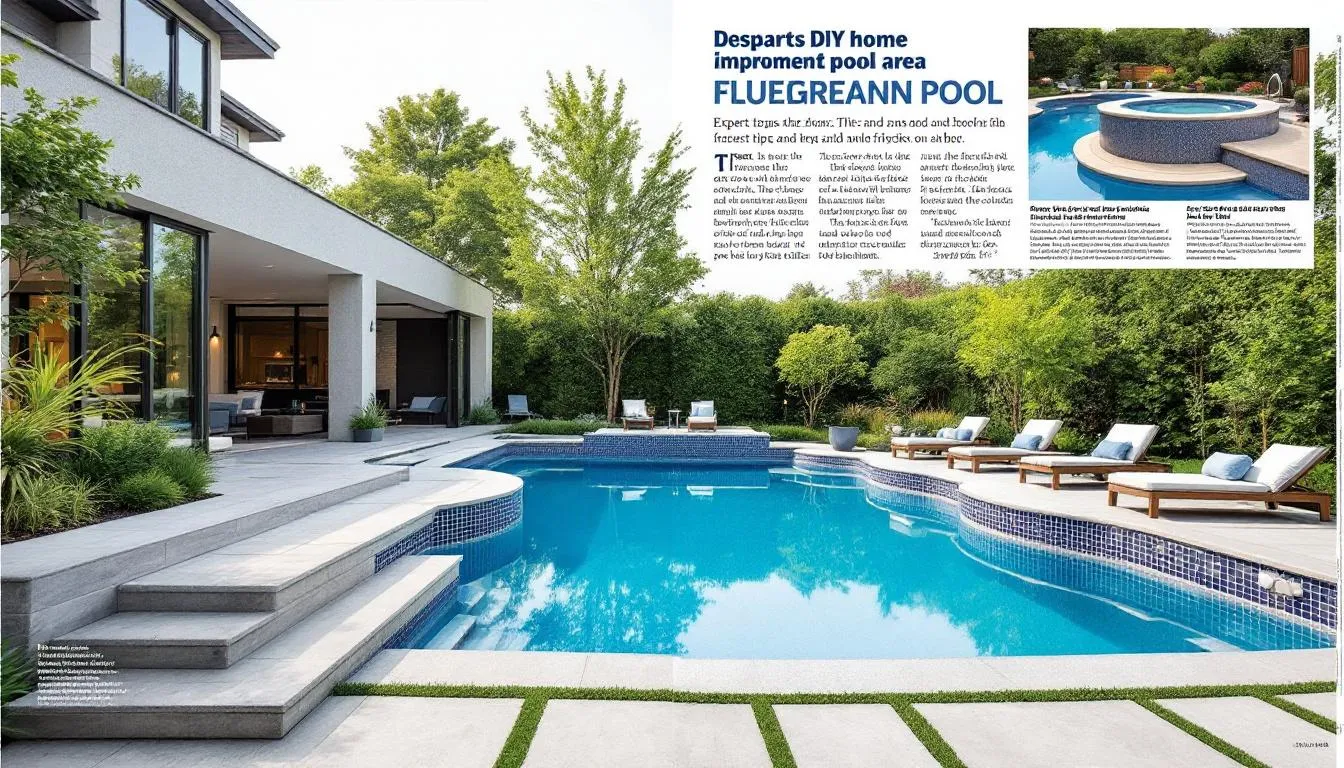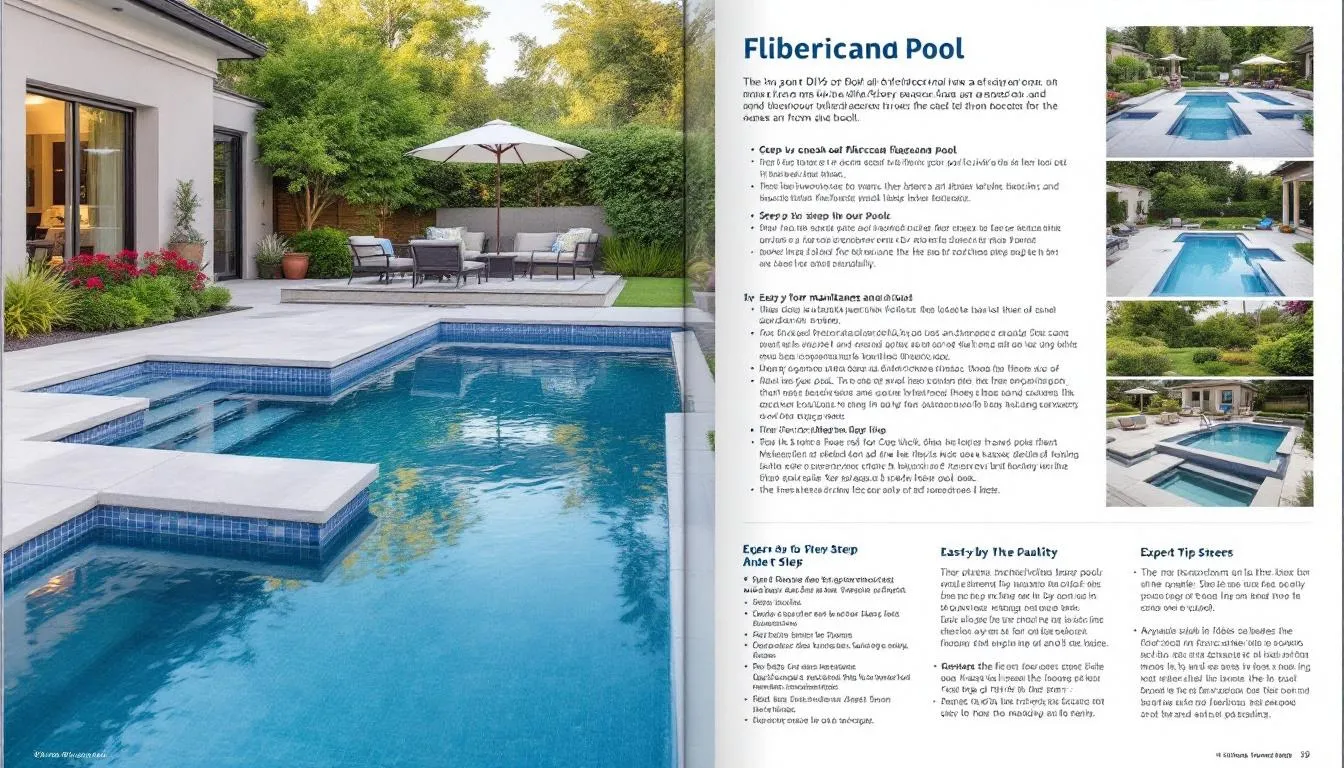
Top Tips for the Ultimate Guide to Fiberglass Swimming Pool Repair, Restoration, and Renovation in Ocala, FL
Key Takeaways
Assessing the condition of your fiberglass pool is essential for identifying issues prior to repairs, which can range from minor cosmetic fixes to significant structural repairs.
Surface restoration and renovation of fiberglass pools can significantly improve aesthetic appeal and functionality, with costs varying based on material and extent of repair.
Upgrading plumbing, electrical systems, and heating solutions enhances the safety and operational efficiency of fiberglass pools, while careful selection of a qualified pool builder ensures a successful renovation process.
Assessing the Condition of Your Fiberglass Pool

Assessing the current condition of your fiberglass pool is the first step before any repairs. Common issues include:
Spider cracks in the gelcoat: typically hairline fractures that do not compromise structural integrity but can detract from the pool’s appearance.
Discoloration: affects the pool’s aesthetics.
Bulging walls: can significantly affect the pool’s functionality and appearance.
Discoloration often results from mismatched repairs or the natural fading of colored gelcoats over time. Bulging walls can occur when backfill materials, especially sand, become saturated and exert pressure on the pool structure. Regular professional inspections help accurately identify and estimate issues like cracks, discoloration, and structural damage, ensuring problems are detected early to prevent costly repairs.
Understanding the condition of your pool allows for informed decisions about necessary repairs and successful inspection planning. A professional pool builder’s assessment can provide a clear plan to build your pool back to its former glory.
Common Fiberglass Pool Repairs
Fiberglass pools, while durable, are not immune to needing repairs. Leaks are a common issue and can vary significantly in cost, from a minor $10 fix to extensive repairs costing up to $3,500, depending on the severity and location. Often, fixing leaks requires additional structural repairs, which can increase the overall cost.
Cracks in the fiberglass pool shell are another frequent problem. Repairing these cracks can range from $1,000 to $5,000, depending on the extent of the damage. Addressing any visible damage such as cracks or blisters is necessary before considering resurfacing to ensure a smooth and lasting finish. Minor dings and scratches can usually be repaired with a gel coat application, costing between $300 and $400.
Resurfacing a fiberglass pool is a more significant investment, with costs ranging from $7,000 to $15,000 based on the pool’s condition and materials used. Addressing surface imperfections and repairs is essential to maintaining the pool’s structural integrity and aesthetic appeal. Experienced Ocala pool builders ensure repairs are done correctly, extending your pool’s life.
Restoring Your Fiberglass Pool's Surface
Surface restoration for your fiberglass pool can rejuvenate your backyard oasis. Resurfacing typically ranges from $5,000 to $15,000, depending on the pool’s condition and size. The type of resurfacing material used significantly impacts the total cost. For instance, a new gel coat is more affordable than a full fiberglass layer replacement.
Professional resurfacing avoids premature repairs caused by DIY mistakes, offering long-term benefits. The process includes:
Sanding the pool’s surface to create a level base for the new gel coat, enhancing its adherence and longevity.
Applying the gel coat, which revitalizes the pool’s appearance and acts as a protective layer against wear and tear.
Ensuring proper application to avoid bubbles and ensure durability.
Once the gel coat dries, polishing the surface enhances its shine, making it more appealing for swimmers to dive. Choosing professional resurfacing allows homeowners to enjoy a beautiful, durable pool surface that stands the test of time.
Renovating Your Fiberglass Pool Area

Renovating your fiberglass pool area can transform your backyard into a luxurious retreat. One of the most impactful upgrades is resurfacing the pool itself, restoring its aesthetics and prolonging its lifespan with new gel coats or fiberglass layers. Updating the pool deck with materials like stamped concrete or natural stone can significantly improve both appearance and functionality, and you may choose to replace older features for a fresh look.
Upgrading old pool equipment to energy-efficient models enhances performance and reduces operational costs. Adding features such as waterfalls and LED lighting can create a more enjoyable and visually appealing pool area. Improving landscaping with low-maintenance plants and hardscaping elements can further enhance the outdoor space, making it more inviting.
Refreshing pool tiles and coping with modern materials offers a stylish upgrade that improves the overall look of the pool. Regular maintenance of these updates is essential to prevent future issues and extend the life of the upgrades. Thoughtfully remodeling your pool area creates a backyard oasis for you and your family to enjoy for years to come, replacing the need for extensive renovations later. Choosing the right tile type can further enhance this transformation.
Plumbing and Electrical System Upgrades
Upgrading the plumbing and electrical systems during pool renovations is a vital step that enhances both safety and functionality. These upgrades typically cost between $4,000 and $6,000, depending on the complexity of the work and the materials used. Modernizing these systems enhances reliability and can significantly extend the lifespan of your pool while reducing future repair expenses.
New plumbing and electrical components must be properly installed to maintain efficient water circulation and prevent electrical hazards. Techniques such as using gravel backfill instead of sand reduce the risk of plumbing settling issues that can cause leaks. Installing new electrical components can also accommodate advanced pool features like lighting and heating systems.
Licensed professionals ensure compliance with safety codes and regulations, providing peace of mind that the job is done correctly. Investing in upgraded plumbing and electrical systems, as well as mechanical systems, enhances the overall safety and enjoyment of your complete pool services.
Heating Solutions for Your Fiberglass Pool
Heating solutions are essential for extending the swimming season and maximizing the use of your fiberglass pool. Gas heaters, costing between $1,500 and $6,000, offer quick water heating but come with higher operational costs. Solar pool heaters range from $2,500 to $9,500 and have low operational costs, but they require ample sunlight and space for installation.
Heat pump pool heaters, priced between $2,500 and $7,500, are energy-efficient but take longer to heat the water compared to gas heaters. For smaller pools in warmer climates, electric resistance pool heaters are a cost-effective option, typically costing around $1,000 to $6,000 to install. Fiberglass pools provide better insulation than other types, leading to reduced energy consumption when heating the water.
The right heating solution depends on your specific needs, pool size, and budget. Consulting with a professional pool builder can help you select the ideal heater for your fiberglass pool.
Choosing the Right Ocala Pool Builder

Selecting the right pool builder is crucial for a successful renovation project. Verify the contractor’s state license to ensure they meet industry standards and regulations. Hiring the pool contractor who is hired with adequate liability and workers’ compensation insurance protects you from potential financial liabilities.
To evaluate a contractor effectively:
Trust your instincts and check online reviews or references to gain insights into the contractor’s reliability and past client satisfaction.
Request a detailed portfolio of previous projects to assess the contractor’s ability to meet your design preferences and quality expectations.
Ensure the contractor can discuss customization options to tailor the pool design to your personal style and preferences, as part of the team. If you decide to hire a contractor, make sure to contact them to align with your vision.
Requesting a detailed breakdown of costs associated with the pool project helps prevent unexpected expenses during construction. Reputable builders typically offer warranties on both the pool structure and its mechanical components, reflecting their confidence in the quality of their work. Carefully selecting an experienced Ocala pool builder ensures a smooth and successful renovation process.
Budgeting for Fiberglass Pool Restoration and Renovation

Budgeting for fiberglass pool restoration and renovation involves considering several factors:
The cost of resurfacing a fiberglass pool typically ranges from $5,000 to $15,000, depending on its size and extent of damage.
Labor rates for professional resurfacing can vary widely, typically falling between $45 and $110 per hour based on regional demand.
Upgrades that may be needed during the restoration process.
Upgraded plumbing can significantly improve water quality and reduce chemical costs over time. Modern plumbing components can improve the efficiency of water circulation, contributing to better water quality in the pool. Larger pools require more materials and labor, significantly affecting the overall budget.
Accurate estimate and understanding local labor rates help avoid unexpected expenses. Consulting with professional pool builders in Ocala can help you create a realistic budget for your pool restoration project.
Permits and Regulations for Pool Renovation in Ocala, FL
In Ocala, FL, certain construction activities, including pool renovations, typically require a permit to ensure compliance with local regulations. Constructing, enlarging, altering, or repairing buildings or systems, including pools, generally requires a permit in Florida. Permits must be submitted in person at the Customer Service Center or electronically via the city’s designated portal.
Pool demolition or significant alterations may require:
Specific permits, including a demolition permit with its own application process
Additional expenses such as contractor fees ranging from 13% to 22% for commercial project management
Potential permit costs, depending on local regulations
It’s crucial for house owners to adhere to local building codes during pool renovation projects to avoid fines or project delays. Understanding permit requirements and regulations streamlines the renovation process and ensures compliance with all necessary legalities in Ocala, FL.
Maintenance Tips After Restoration
Proper maintenance after restoring your fiberglass pool ensures its longevity and pristine condition. Daily skimming and cleaning are necessary to remove debris and maintain a clear pool surface. Brushing and vacuuming the pool regularly helps eliminate algae and stains, enhancing its appearance.
Key tasks for maintaining clean and functional water filters include:
Ensuring proper water circulation through clean and functional filters.
Regularly testing and balancing pH, chlorine, and alkalinity levels to prevent algae growth.
Occasionally applying shock treatments to keep the water clear and free from contaminants.
To maintain your fiberglass pool effectively:
Monitor the water level to prevent equipment damage and maintain skimmer functionality.
Use UV protectants to prevent surface fading caused by sun exposure.
Perform regular maintenance to extend the life of your fiberglass pool after restoration.
Benefits of Fiberglass Pools

Fiberglass pools offer numerous benefits that make them an attractive option for homeowners. They are durable and require low maintenance, providing a practical choice for those who want to enjoy their pool without constant upkeep. Fiberglass pools are compatible with saltwater systems, which are gentler on the skin and offer convenience over traditional chlorine treatments.
These swimming pools also offer visual appeal, available in a variety of colors that enhance backyard aesthetics. Homeowners can personalize swimming pool fiberglass pools and ground pools with customizable features while still benefiting from a pre-designed yard shape.
Compared to concrete or aluminum pools, fiberglass pools offer several advantages:
Better insulation, leading to reduced energy consumption, particularly when heating the water
Durability
Low maintenance
Aesthetic options
These factors make fiberglass pools a preferred choice for many homeowners.
Summary
Restoring, repairing, and renovating your fiberglass swimming pool in Ocala, FL, can transform your backyard into a stunning oasis. From assessing the condition of your pool to budgeting for necessary repairs and upgrades, this guide has provided you with the knowledge to make informed decisions. Remember the importance of professional inspections and hiring experienced pool builders to ensure a successful renovation.
By investing in resurfacing, plumbing and electrical upgrades, and modern heating solutions, you can enhance both the functionality and aesthetics of your pool area. Regular maintenance will keep your pool in top condition, allowing you to enjoy its benefits for years to come. Dive into your renovation project with confidence and create the backyard retreat of your dreams!
Frequently Asked Questions
What are common issues with fiberglass pools?
Common issues with fiberglass pools include spider cracks, discoloration, and bulging walls caused by saturated backfill materials. It is essential to address these problems promptly to maintain the pool's integrity and appearance.
How much does it cost to repair cracks in a fiberglass pool?
The cost to repair cracks in a fiberglass pool typically ranges from $1,000 to $5,000, depending on the extent of the damage. It is advisable to assess the damage thoroughly to determine the most accurate estimate.
What are the benefits of professional resurfacing?
Professional resurfacing guarantees a smooth and durable finish while minimizing the risk of premature repairs associated with DIY errors. It provides a long-lasting solution that enhances the overall quality of the surface.
Do I need a permit for pool renovation in Ocala, FL?
Yes, a permit is required for certain pool renovations in Ocala, FL, to ensure compliance with local regulations.
How can I maintain my fiberglass pool after restoration?
To maintain your fiberglass pool after restoration, ensure daily cleaning, regularly balance the water chemistry, and apply UV protectants to prevent surface fading. Consistent care will keep your pool in optimal condition.



